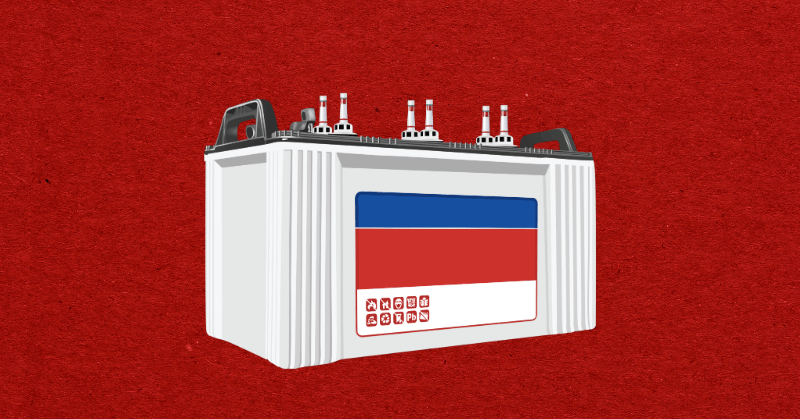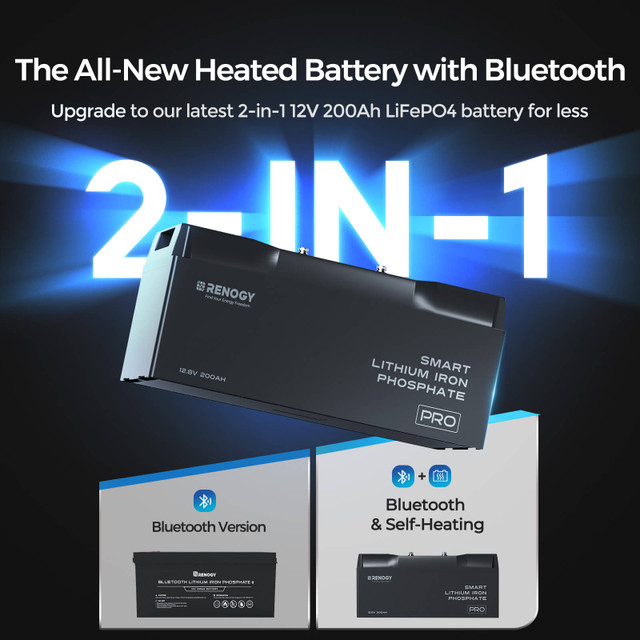Types of Solar Batteries: How to Make the Right Choice?
All electronic devices need batteries to perform their functions appropriately. The same is the case with the solar power system. A battery is the backbone of a solar electric system that powers up the whole system to get the most out of it. It provides you with a backup energy source to offer enough power for your electronic and electric appliances.
Different types of batteries can be installed in a solar system, such as nickel cadmium, flow, lead-acid, and lithium-ion batteries. Tips for choosing the best out of them all are provided in the discussion below.
This article mainly focuses on the types of solar batteries and their importance. It also presents a comparison between AC-coupled and DC-coupled batteries. Let's get into further specifics.
The importance of solar batteries
Many people are usually concerned about “why add a battery to a solar system if it can work without it.” Do you have the same thing in mind?
Well, there are a number of reasons why it is important to add a battery to your solar power system. A few of them are as follows.
- You get an uninterrupted source of constant power.
- It helps you save electricity bills significantly.
- You don't need to depend on the utility provider.
- Unfavorable net metering policies don't bother you when solar batteries are installed in the system.
Some people prefer to go for new technology, which is why they install battery storage to their solar electric systems. Nowadays, millions of homeowners have been shifted to this technology.
Remember, before you shift to this technology, don't forget to establish goals. It will help you choose the right battery that best matches your needs.
For example, a homeowner who wants to save electricity bills will choose an entirely different battery type compared to a tech enthusiast. We will discuss how to select the right battery type for your solar system later in this guide.

Some of the potential benefits of installing a solar battery are given below.
- It swims your worries away whether electricity prices go up or down.
- If your solar electric system is large enough to run all of your home appliances, you can enjoy free electricity all the time.
- The power that comes from the battery backup sources is way cheaper than the power coming from the utility grid.
- A solar battery eases the variations in the flow of solar energy that happens with the changes in the amount of sunlight that falls on your solar panels.
Let's now explore the different kinds of batteries you can attach to your solar power systems.
Types of solar batteries
According to the US Department of Energy, lithium-ion batteries come with high power density and high energy density. In comparison to other battery types, lithium-ion batteries discharge at a slower rate. Considering these factors, the US homeowners commonly use li-ion batteries in residential solar energy systems.
Getting familiar with various battery types is crucial, as it helps you make an informed decision to get the most out of your solar energy system. Below is a list of different kinds of batteries you can attach to your residential or commercial solar system. Let's look at each type one by one.
1. Nickel cadmium battery
It was first developed in the 1800s but it gained popularity later in the 1980s. This battery type is not designed and developed to be installed with solar energy systems. It is not commonly used in home solar systems. Some battery manufacturers have started working on this technology to make it enhanced and more accessible.
Nickel cadmium battery is considered a top choice in the aircraft industry. Just because of its durable nature, it is used for large-scale applications.
People like it for
- Low maintenance
- Durability
- It does not need any complex battery management system
- Performs well at extreme temperatures
People dislike it for
- The memory effect can limit its ability to hold the charge
- The toxicity of cadmium
2. Lead acid battery
It has been a popular choice for solar installers for years. A lead-acid battery has been serving the energy storage industry since the 1800s. This deep-cycle battery is more commonly used with an off-grid solar energy system.
Lead acid batteries are divided into two different types, i.e., sealed lead acid batteries and flooded lead acid batteries. Along with frequent applications in off-grid systems, these batteries are considered reliable for emergency backups when a power outage occurs.
People like it for
- They are easily disposable
- Cost-effectiveness
- Easy recycling
- Dependable structure and performance
People dislike it for
- Shorter life cycle
- It needs maintenance regularly
- Occupy more space
3. Flow battery
Though it is considered a modern technology in the battery industry, it was first invented in 1884. In this battery type, liquid (water-based) electrolyte flows between two separate tanks or chambers. When a battery is charged, energy gets stored due to the chemical reactions.
Due to the large size, it is a bit more costly than other batteries. The larger size and higher prices make a flow battery not a good choice for home solar electric systems.
However, a few companies manufacture flow batteries for residential applications. Redflow is one of them. It manufactures a ZCel flow battery for home solar systems.
People like it for
- It comes with a 100% depth of discharge ability
- Performs well in extreme heat
- A lifespan of up to 30 years
- Fire risk is minimal
People dislike it for
- Bigger size
- Low storage capacity
- Higher price
- Low charge/discharge rate
4. Lithium ion battery
In the world of battery storage, lithium-ion batteries are the new player. With the rising demand for electric vehicles, manufacturers have now understood the real importance of these batteries. They are the widely installed solar battery banks for maximized performance in residential applications.
A lithium-ion battery has a wide range of applications. It is used in electric toothbrushes, vaping devices, laptops, digital cameras, mobile phones, solar power backup storage, hoverboards, and the list goes on. Tesla Powerwall also uses lithium-ion batteries.
People like it for
- Long lifespan
- It needs little to no maintenance
- High depth of discharge
- High energy density
People dislike it for
- It is costly compared to other batteries
- The change of thermal runaway increases if it is not installed correctly

Renogy offers premium-quality solar batteries at a fair cost. Explore the best collection to get reliable batteries for your residential or commercial system.
DC-coupled vs AC-coupled solar batteries
Solar panels produce DC power. Batteries also store DC power. In comparison, electricity used in buildings, homes, or offices is AC power. Therefore, if you want to use the battery as a backup energy source to power up your appliances, you will have to first convert the DC power into AC power. This is where a solar inverter plays its part.
When the energy is converted from AC to DC or DC to AC, a smaller portion of it is lost. The presence of an inverter in the setup differentiates AC-coupled and DC-coupled batteries.
An AC-coupled battery comes with its own inverter, whereas a DC-coupled battery makes a direct connection with a hybrid string inverter.
Simply put, round-trip efficiency creates the major difference between AC-coupled and DC-coupled batteries. AC-coupled systems need multiple energy inversions (DC to AC and AC to DC). On the other hand, DC-coupled systems require only one energy inversion.
Therefore, more energy is lost in AC-coupled systems than in DC-coupled systems. This is why the round-trip efficiency of AC-coupled and DC-coupled systems is 85-90% and 97.5%, respectively.
Which one is better?
Well, it actually depends on where you want to use the battery. If you look at the round-trip efficiency, DC-coupled batteries become the top choice. But, they are very difficult to configure or add into your existing solar power system. The reason behind this fact is that existing systems already have inverters to convert the DC solar energy into AC power for residential use.
Therefore, if you want to add a new battery to your existing solar electric system, an AC-coupled battery will be a perfect choice. In comparison, if you have a plan to add solar panels and batteries at the same time, proceed with DC-coupled batteries.
Find the right solar battery type for you
Usually, a lithium-ion battery is considered the best battery for solar power storage. It has a higher efficiency and stores more energy in less space. In addition, a lithium-ion battery can discharge most of its stored energy.
Moreover, since a lithium-ion battery is commonly used, you can easily find a solar installer who can perfectly configure it to your solar power system. The cost of this battery is slightly higher than other batteries, as stated earlier.
If you have a tight budget and don't want to purchase the lithium-ion battery, purchase a lead-acid battery. You can buy it at a lower cost. Plus, it has been around for decades.
Though flow batteries and nickel cadmium batteries are also available on the market, lead acid and lithium-ion batteries are the most common choice. Therefore, try installing any of these two batteries into your home solar systems. They both are good for a reason.
If you are still concerned about which battery to choose, you can call an expert solar installer to get professional suggestions and assistance. This is how you can select the right battery type for your solar system.
FAQs
Which solar battery lasts the longest?
Out of all batteries used to power up solar electric systems, lithium-ion batteries have the longest lifespan. The reason behind this fact is that they have extremely low self-discharge ability, which is why they hold the charge for a longer period than all other regular batteries. An advanced lithium-ion battery comes with an average lifespan of between 2 and 10 years. Some batteries can even last for up to 20 years if maintained properly.
What type of battery is used in a solar system?
Lithium-ion and lead-acid batteries are the two common types often used in solar electric systems. A lithium-ion battery has a better discharge rate, enhanced energy retention, and high storage capacity. All these factors contribute to making a lithium-ion battery a top choice for leading solar installers across the globe.
What type of battery is best for solar?
Batteries we use in our home solar systems are usually made up of one of three chemical compositions, i.e., saltwater, lead acid, and lithium-ion. Out of them all, lithium-ion batteries are an ideal choice for solar power systems. Though other batteries are affordable, none can beat lithium-ion batteries in terms of the overall performance. A lithium-ion battery comes with a longer lifespan and higher depth of discharge.
Ending note
A complete solar electric system consists of different components, such as PV panels, the mounting structure, an inverter, batteries, DC wires, and more. Out of them all, batteries have a special place. Plus, they are the most expensive components.
Different types of solar batteries are accessible from the market. They include nickel cadmium batteries, lead acid batteries, flow batteries, and lithium-ion batteries. Out of these four battery types, lead acid and lithium-ion batteries are most commonly used in solar power systems. However, lithium-ion batteries are on top of all of them.
In terms of energy density, storage, longevity, and depth of discharge, a lithium-ion battery is perfect. You must have heard about AC-coupled and DC-coupled batteries. Read more about them in the discussion above. If you want to get the best solar battery for your home solar energy system, look no further than Renogy.










